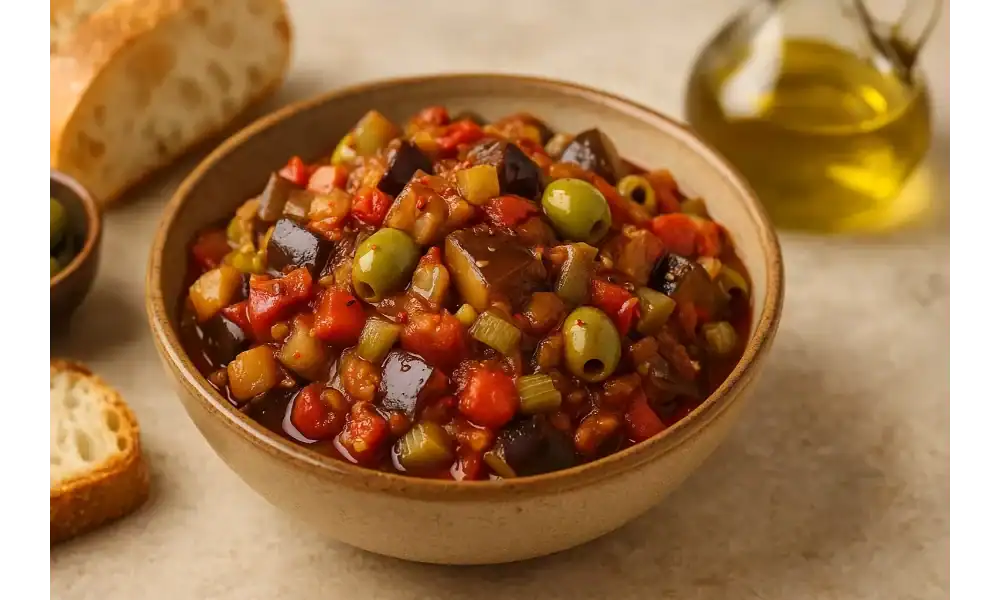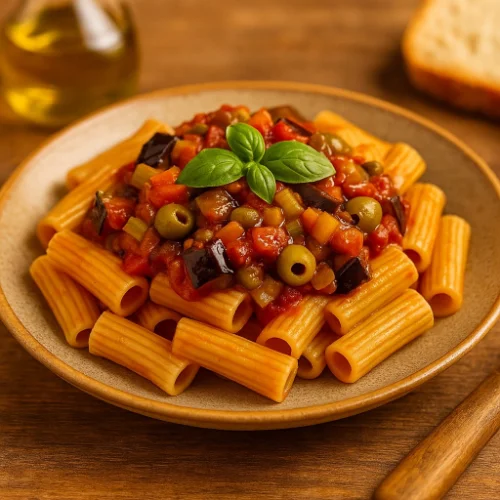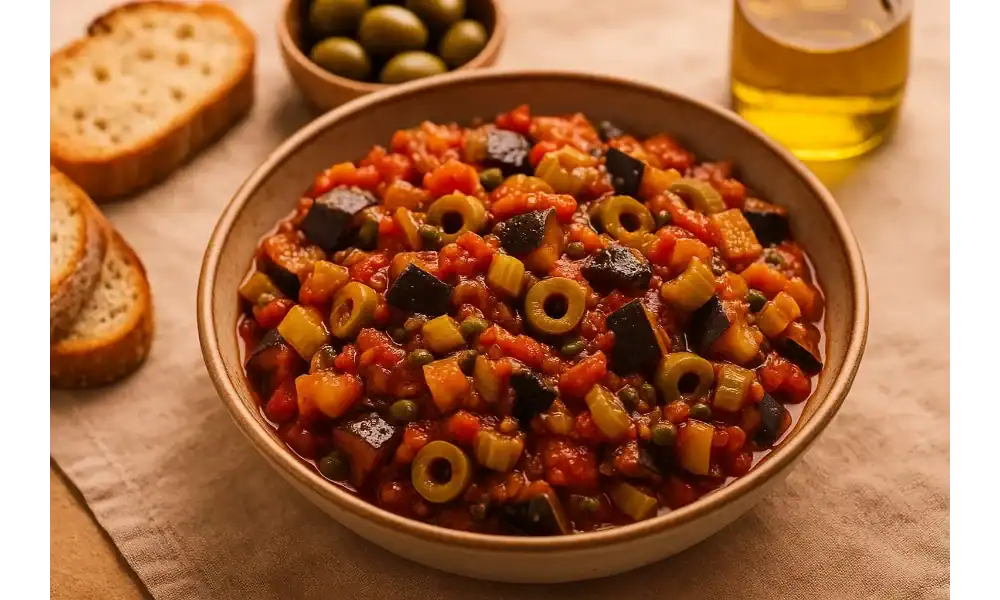Introduction
Sicilian Caponata Eggplant is a true taste of the Mediterranean. This traditional Italian recipe blends fresh eggplant, tomatoes, olives, and capers into a sweet-and-sour masterpiece. Born in the heart of Sicily, it’s packed with bold flavors and vibrant colors. The mix of tender vegetables, tangy vinegar, and a touch of sweetness makes it both comforting and refreshing. You can enjoy it as a side dish, a tasty appetizer, or even a light main course. It’s naturally vegan, healthy, and full of nutrients. With simple steps and fresh ingredients, you can make this authentic Caponata Eggplant at home and bring a slice of Sicily to your table.
For more eggplant recipes, try our:
- How to Make Traditional Caponata at Home – Easy Italian Eggplant Dish
- How to Make the Best Ratatouille – Authentic Provençal Vegetable Stew
- How to Make the Best Babaganoush at Home (Middle Eastern Eggplant Dip)
- Best Ever Baked Eggplant Parmesan – Simple Step-by-Step Guide
- Top 15 Eggplant Recipes You’ll Want to Make Again and Again
What Is Sicilian Caponata Eggplant?
Origins of Caponata in Sicily and Its Cultural Significance
Caponata began in Sicily. Fishermen and families cooked it to preserve summer vegetables. Its sweet-and-sour “agrodolce” taste tells a classic Italian story. Today, it still anchors the Sicilian table and celebrates Mediterranean cooking.
Main Ingredients: Eggplant, Tomatoes, Olives, Capers, Celery
The heart is eggplant. Then come tomatoes, onions, and celery for body. Green olives and capers add briny bite. Extra-virgin olive oil, vinegar, and a hint of sugar balance it. You can add pine nuts or raisins for a Sicilian twist.
Flavor Profile: Sweet, Sour, and Savory Blend
This Italian Caponata recipe mixes sweet and sour with deep savory notes. Vinegar brightens each bite, while olives and capers add salt and tang. Soft eggplant soaks up flavors and ties everything together.
How It’s Served: Antipasto, Side Dish, or Topping for Bread
Serve Sicilian Caponata Eggplant at room temperature. Spoon it on crostini for a Mediterranean appetizer. Pair it with grilled fish or roast chicken. Or toss it with pasta, rice, or quinoa for a light meal.
Why It’s Popular in Mediterranean and Vegan Cuisine
It’s plant-based, dairy-free, and naturally vegan. Olive oil and vegetables make it wholesome and heart-friendly. It fits mezze spreads, weekday meals, and make-ahead menus. Simple steps and bold flavor keep this vegan Italian recipe in demand.
Ingredients for the Best Italian Caponata

Fresh Eggplants (Aubergines) as the Main Star
Choose firm, glossy eggplants. Pick medium ones for fewer seeds. Cut them into even cubes. Salt them briefly to draw out water and tame bitterness. This step makes your Sicilian Caponata tender yet meaty.
Tomatoes, Onions, and Celery for a Rich Base
Start with onions and celery for sweet depth. Then add ripe tomatoes or good canned tomatoes. Let them simmer until thick. This base anchors your Italian Caponata recipe with real Mediterranean flavor.
Green Olives and Capers for Tangy Depth
Use Castelvetrano or another mild green olive. Pit and chop them for clean bites. Rinse the capers to soften their salt. Together, they add briny pop and classic Sicilian character.
Olive Oil, Vinegar, and Sugar for Sweet-Sour Balance
Cook with extra-virgin olive oil for a silky finish. Splash in red or white vinegar for brightness. Add a little sugar to round the edges. Taste and adjust until the agrodolce balance feels right.
Optional Add-Ins: Pine Nuts, Raisins, Fresh Herbs
Toast pine nuts for crunch. Soak golden raisins for soft sweetness. Finish with fresh basil or parsley for lift. These simple add-ins turn your Caponata eggplant into an authentic, restaurant-worthy dish.
Step-by-Step Guide to Making Caponata at Home
Preparing and Salting the Eggplant to Remove Bitterness
First, cut the eggplant into even cubes. Sprinkle with salt and toss. Let it rest for 20–30 minutes. Then rinse and pat dry. This step keeps your Sicilian Caponata tender and not watery.
Cooking the Vegetables Separately for Perfect Texture
Next, heat olive oil and brown the eggplant until golden. Remove it. In the same pan, sauté onions and celery until soft. Add tomatoes and cook until thick. Cooking each part on its own gives this Italian Caponata recipe great texture.
Combining Ingredients and Simmering for Flavor Fusion
Then return the eggplant to the pan. Stir in olives and capers. Pour in a splash of vinegar and a little sugar. Simmer gently so the flavors marry. The Caponata eggplant will turn glossy and rich.
Adjusting Sweetness and Acidity to Taste
Taste and tweak. Add a bit more vinegar for lift. Or add a pinch more sugar for balance. Season with salt and black pepper. Aim for a bright sweet-and-sour bite.
Cooling and Resting for Best Flavor Before Serving
Finally, take it off the heat. Let the Caponata cool to room temperature. Rest it for at least 30 minutes, or chill it overnight. The flavors deepen, and the dish tastes even better the next day.
Tips for Perfect Sicilian Caponata Every Time
Choose Firm, Fresh Eggplants for the Best Texture
Pick heavy, glossy eggplants. They feel tight and smooth. Cut them evenly, then salt and pat dry. This step keeps the Caponata Eggplant silky, not soggy.
Use High-Quality Extra Virgin Olive Oil
Choose a fruity extra virgin olive oil. It lifts the Mediterranean flavors. Also, it gives your Italian Caponata a clean, rich finish.
Let Flavors Meld Overnight for a Richer Taste
Cool the Caponata, then chill it. Wait until the next day. The sweet-and-sour notes deepen. As a result, your Sicilian Caponata tastes fuller and rounder.
Balance Vinegar and Sugar to Suit Your Palate
Start small, then taste and adjust. Add vinegar for brightness. Add a touch of sugar for roundness. Aim for a lively agrodolce balance.
Serve at Room Temperature for Authentic Flavor
Take it out of the fridge 20–30 minutes before serving. The aromas open up. Spoon onto crostini, or pair with grilled fish or salads. Enjoy true Sicilian flavor at home.
How to Serve and Store Eggplant Caponata

Serve as an Antipasto with Crusty Bread or Crostini
Spoon Sicilian Caponata Eggplant over warm crostini. Add a drizzle of extra virgin olive oil. Garnish with basil. You get a bold Mediterranean appetizer in minutes.
Use as a Topping for Pasta or Grilled Fish
Toss Italian Caponata with al dente pasta for a quick meal. Or spoon it over grilled fish for sweet-and-sour balance. Both options taste fresh and light.
Pair with Fresh Salads for a Light Summer Meal
Serve Caponata beside arugula or tomato-cucumber salad. Add lemon and herbs for lift. The flavors match well and keep the plate bright and healthy.
Store in the Fridge for Up to 5 Days in an Airtight Container
Let the Caponata cool, then pack it in a sealed container. Refrigerate for 3–5 days. Stir before serving to wake up the agrodolce notes.
Freeze for Up to 3 Months for Future Meals
Portion the Caponata into freezer-safe containers. Label and freeze for up to 3 months. Thaw overnight in the fridge, then bring to room temperature for the best flavor.
Sicilian caponata Rigatoni Recipe

Sicilian caponata Rigatoni
Ingredients
Method
- Salt eggplant. Toss cubes with 1 tsp salt. Rest 20 min. Rinse and pat dry.
- Brown eggplant. Heat 2–3 tbsp oil in a wide pan. Sauté eggplant until golden and tender. Remove.
- Sauté base. Add 2 tbsp oil. Cook onion and celery 5–6 min. Add garlic 30 sec.
- Make sauce. Stir in tomatoes. Simmer 5–7 min to thicken.
- Finish caponata. Add eggplant, olives, capers, vinegar, sugar, oregano, chili. Season. Simmer 5 min. Adjust vinegar/sugar for agrodolce. Rest 10 min off heat.
- Cook pasta. Boil rigatoni in salted water until al dente. Reserve ½ cup pasta water. Drain.
- Combine. Toss pasta with caponata. Add a splash of pasta water and a drizzle of oil to coat.
- Serve. Top with basil (and pine nuts or ricotta salata, if using). Enjoy warm or at room temperature.
FAQs
1- What is Sicilian Caponata?
It’s a sweet-and-sour Italian eggplant dish from Sicily. You sauté vegetables, then add vinegar and a touch of sugar for classic agrodolce flavor.
2- Do I serve Caponata hot or cold?
Serve it at room temperature. Chill it first, then let it sit out 20–30 minutes for the best Mediterranean taste.
3- How do I remove eggplant bitterness?
Cube the eggplant, salt it, and rest for 20–30 minutes. Rinse and pat dry, then cook.
4- Can I bake the eggplant instead of frying?
Yes. Toss with olive oil and roast at 220°C/425°F until golden. Then add it to the Italian Caponata sauce.
5- Can I make Caponata without sugar?
Yes. Reduce the vinegar slightly and add golden raisins for natural sweetness. Adjust to taste.
Conclusion
Sicilian Caponata Eggplant is easy to make and full of flavor. You sauté, simmer, and let the agrodolce shine. As a result, this Italian Caponata recipe brings a bright Mediterranean taste to any table. Enjoy it as an appetizer, a side, or a light vegan meal. Now try it at home and make it your own. Add raisins or pine nuts. Mix in fresh basil or roasted peppers. Turn up the heat with a pinch of chili. Then taste Sicily in every bite. Finally, share your tips, swaps, and serving ideas in the comments. I’d love to see your version!
For more recipes, try our:
- 19 Simple and Tasty Bruschetta Toppings for an Easy Appetizer
- Best Liver Pâté Recipe: How to Make This Gourmet Spread at Home.
- 10 Delicious Ricotta Breakfast Recipes to Start Your Day Right
- 10 Easy Ricotta Cheese Recipes You’ll Want to Make Again and Again
- 10 Easy Zucchini Recipes You’ll Want to Make All Summer Long

